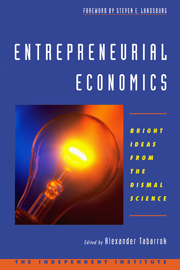Education is the key to the future: You’ve heard it a million times, and it’s not wrong. Educated people have higher wages and lower unemployment rates, and better educated countries grow faster and innovate more than other countries.
But going to college is not enough. You also have to study the right subjects. And American students are not studying the fields with the greatest economic potential.
Over the past 25 years the total number of students in college has increased by about 50%. But the number of students graduating with degrees in science, technology, engineering and math (the so-called STEM fields) has been flat.
Moreover, many of today’s STEM graduates are foreign-born and taking their knowledge and skills back to their native countries. Consider computer technology. In 2009 the U.S. graduated 37,994 students with bachelor’s degrees in computer and information science. This is not bad, but we graduated more students with computer science degrees 25 years ago.
The story is the same in other technology fields. The United States graduated 5,036 chemical engineers in 2009, no more than we did 25 years ago. In mathematics and statistics there were 15,496 graduates in 2009, slightly more than the 15,009 graduates of 1985.
Few fields have changed as much in recent years as microbiology, but in 2009 we graduated just 2,480 students with bachelor’s degrees in microbiology—about the same number as 25 years ago. Who will solve the problem of antibiotic resistance?
If students aren’t studying science, technology, engineering and math, what are they studying? In 2009 the U.S. graduated 89,140 students in the visual and performing arts, more than in computer science, math and chemical engineering combined and more than double the number of visual and performing arts graduates in 1985.
The story is the same in psychology, which graduates about 95,000 students a year, more than double the number of 25 years ago and far in excess of the number of available jobs.
Perhaps most oddly, despite the decline in the number of news media jobs, especially in the print media, the number of students in communication and journalism also has nearly doubled since 1985.
There is nothing wrong with the arts, psychology and journalism, but graduates in these fields have lower wages and are less likely to find work in their fields than graduates in science and math.
As a result, more than half of all humanities graduates end up in jobs that don’t require college degrees. Baggage porters and bellhops don’t need college degrees, but in 2008 17.4% of them had at least a bachelor’s degree and 45% had some college education. Mail carriers don’t need a college education, but in 2008 14% had at least a bachelor’s degree and 61% had some college education.
Not surprisingly, these graduates don’t get much of a financial “bonus” from college. A college graduate in the humanities who finds a job requiring a college degree had median annual earnings in 2009 of $21,000. For those who ended up in jobs not requiring a college degree, the median was just $14,000.
Moreover, arts, psychology and journalism graduates are less likely to create the kinds of innovations that drive economic growth.
Economic growth is not a magic totem to which all else must bow, but it is one of the main reasons we subsidize higher education.
The potential wage gains for college graduates go to the graduates—that’s reason enough for students to pursue a college education. We add subsidies to the mix, however, because we believe education has positive spillover benefits that flow to society. One of the biggest of these benefits is the increase in innovation that highly educated workers bring to the economy.
As a result, an argument can be made for subsidizing students in fields with potentially large spillovers, such as microbiology, chemical engineering, nuclear physics and computer science. There is little justification for subsidizing majors in the visual arts, psychology and journalism.
College has been oversold. It has been oversold to students who end up dropping out or graduating with degrees that don’t help them very much in the job market. It also has been oversold to the taxpayers, who foot the bill for subsidies that do nothing to encourage innovation and economic growth.












